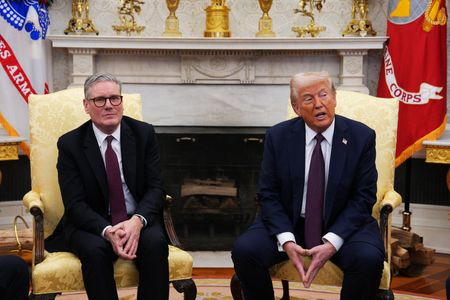By Anita Komuves
BUDAPEST (Reuters) -U.S.-funded Radio Free Europe/Radio Liberty (RFE/RL) will shut down in Hungary on Friday, it said, ending a five-year run of a media service that a U.S. official said had damaged President Donald Trump’s foreign policy in a key ally.
Launched originally in 1950 to broadcast to communist-run countries during the Cold War, RFE/RL still reaches millions in eastern Europe, including Russia and Ukraine, as well as central Asia and the Middle East, aiming to support media freedom.
But the news service has been hit hard by efforts to downsize government under Trump, who counts Hungarian Prime Minister Viktor Orban, a right-wing nationalist, as a close ally in the European Union.
Kari Lake, Trump’s administrator in the U.S. Agency for Global Media that oversees RFE/RL, said this month that taxpayer-funded programming should not be used to “destabilize” Hungary.
In a November 5 letter to Congress, re-posted by Lake on the X social media site, she said funding for RFE/RL would end and that its “programming has undermined President Trump’s foreign policy by opposing the duly elected Prime Minister of Hungary.”
ORBAN’S TIGHTENING GRIP OVER MEDIA
Hungary was one of only three EU member states that RFE/RL operated in, alongside Romania and Bulgaria.
In a statement late on Thursday, RFE/RL said its team had “worked with dedication to provide independent journalism for audiences in Hungary”.
Hungary transitioned to democracy from communism in 1989 like other countries in central Europe that are now EU members. While RFE/RL’s Hungarian service ended in 1993, it was relaunched in 2020 due to what it called “a decline in diverse media voices” there.
Critics have accused Orban of tightening media control during the more than 15 years he has been in power. Public media have come under full government control and several private outlets have been shut or taken over by government-friendly owners. Orban has denied stifling media freedoms.
RFE/RL’s Hungarian service Szabad Európa, an online news site that also produced video reports and podcasts, reported on government efforts in the courts and justice system, and won a 2024 legal battle to gain access to state highway contracts.
TOUGH ELECTION AHEAD
Orban trails the new centre-right opposition party Tisza in polls before an election next year.
The Hungarian leader met Trump at the White House on November 7, where he secured a one-year reprieve from U.S. sanctions on Russian oil and gas on which Hungary relies.
Orban was also granted a potential U.S. financial shield as an alternative to EU funding frozen due to Budapest’s disputes with Brussels over issues including corruption, rule of law and press freedom.
“The Globalists are more than welcome to hate our ally Viktor Orban,” Lake posted on X on the day of the meeting.
“What they are not entitled to is the use of YOUR money to destabilize the Hungarian regime via taxpayer-funded programming on Szabad Európa. We’re putting a stop to that.”
The global Reporters Without Borders press freedom group called the RFE/RL shutdown in Hungary a “serious blow to Hungarians’ right to information” before the 2026 election.
(Reporting by Anita Komuves and Jason Hovet; editing by Mark Heinrich)









